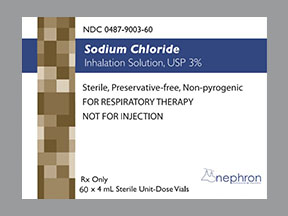
Sodium Chloride Coupons & Savings Card – Discount Prices from $1.01
Generic for: Normlgel, Wound wash saline, Hypersal
My prescription
Edit
50 nebulization solutions 15ML of 3%, Sodium Chloride (1 Plas Cont)
Select pharmacy

CVS
$19.18
COUPON PRICE
Walmart
$1.01
COUPON PRICE
Walgreens
$2.00
COUPON PRICE
Albertsons
$2.61
COUPON PRICESodium Chloride savings card
Show this card to your pharmacist
Walmart
$1.01
BIN
ID
PCN
GRP
019876
LHE32B52A1
CHIPPO
LHX
Powered by
Price history for Hypersal (brand) & Sodium Chloride (generic)
1 Plas Cont, 15ML of 3%
Average retail price for Hypersal
Average retail price for Sodium Chloride
Average SaveHealth price for Sodium Chloride
Our price history data is based on aggregated prescription data collected from participating pharmacies in America. Our prescription data updates daily to reflect the latest price changes. If you notice a missing data point, it means there wasn't sufficient data available to generate a monetary value for that date.
We analyzed Sodium Chloride prices for (15ML of 3%, 1 Plas Cont) over the last 12 months. The average retail price was $14.88, while the average price using the SaveHealth discount card was $5.84. That's a savings of approximately 60.75% when using our Sodium Chloride coupon.
Compared to the generic version, Hypersal had an average price of $1.20 over the same time period. With the SaveHealth savings card, Sodium Chloride is -386.67% cheaper on average than Hypersal.
*Retail prices are based on pharmacy claims data, and may not be accurate when we don't have enough claims.
Sodium Chloride dosage forms
Dosage Quantity Price from Per unit 4ML of 7% 1 Plas Cont $1.01 $1.01 4ML of 7% 2 Plas Conts $1.01 $0.51 4ML of 7% 3 Plas Conts $1.01 $0.34 15ML of 3% 1 Plas Cont $1.01 $1.01 15ML of 3% 2 Plas Conts $1.01 $0.51 15ML of 3% 3 Plas Conts $1.01 $0.34 15ML of 0.9% 1 Plas Cont $1.01 $1.01 15ML of 0.9% 2 Plas Conts $1.01 $0.51 15ML of 0.9% 3 Plas Conts $1.01 $0.34 15ML of 10% 1 Plas Cont $1.01 $1.01
| Dosage | Quantity | Price from | Per unit |
|---|---|---|---|
| 4ML of 7% | 1 Plas Cont | $1.01 | $1.01 |
| 4ML of 7% | 2 Plas Conts | $1.01 | $0.51 |
| 4ML of 7% | 3 Plas Conts | $1.01 | $0.34 |
| 15ML of 3% | 1 Plas Cont | $1.01 | $1.01 |
| 15ML of 3% | 2 Plas Conts | $1.01 | $0.51 |
| 15ML of 3% | 3 Plas Conts | $1.01 | $0.34 |
| 15ML of 0.9% | 1 Plas Cont | $1.01 | $1.01 |
| 15ML of 0.9% | 2 Plas Conts | $1.01 | $0.51 |
| 15ML of 0.9% | 3 Plas Conts | $1.01 | $0.34 |
| 15ML of 10% | 1 Plas Cont | $1.01 | $1.01 |
| 15ML of 10% | 2 Plas Conts | $1.01 | $0.51 |
| 15ML of 10% | 3 Plas Conts | $1.01 | $0.34 |
